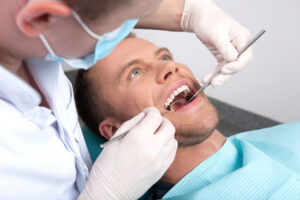Author: nearmedental
Dental decay is among the significant issues among children. Decay may start very early in life. It is the role of all parents and guardians to ensure that this is prevented.
Decay is often caused by bacteria that are present in the foods given to children. Bacteria need three things to grow – water, food, and warmth. All these three are found in our mouths. As the bacteria grow, it dissolves the enamel, resulting in cavities.
Children typically develop their first set of teeth between four and six months. By two years, all primary teeth have already developed. Teething is not only the main milestone in the life of young children. It is also the most challenging. As the first teeth start growing, the child’s gums may get red and inflamed.
Decay is more common in children who are bottle-feeding than those who breastfeed. The formula given to babies contains sugar, which contributes to teeth problems. Baby bottle decay is made worse for parents who make it a habit of putting their kids to bed using the bottle.
Primary Dental Decay Causes
Babies need to develop strong, healthy teeth because they aid in speech, chewing food, and maintaining a healthy smile. When they lose their teeth at an early age, there is a likelihood that their permanent teeth will become misaligned.
Each time bacteria in the mouth interact with carbohydrates, cavities do occur. The bacteria convert the sugars in the carbohydrates into acid that destroys the enamel. Under normal circumstances, saliva aids in digesting these sugars, minimizing the occurrence of decay. During the night, the production of saliva decreases, and swallowing also reduces. This creates an environment for bacteria to thrive.
The extent of tooth decay is determined by the content of the bottle given to the child. Sweetened liquids may easily harm baby teeth, especially if the child is fed on these all the time. Make sure you consult qualified “dentists Brooklyn 11229” in case you notice signs of decay in your baby.
Preventing Decay in Babies
Bottle syndrome, as it is called, causes painful dental aches. The child might find it challenging to feed. When not treated, decay can result in an infection, which can also result in the loss of your child’s primary teeth.
When baby teeth start decaying too early, one of the effects is poor nutrition. Others include crooked adult teeth and speech problems. One way to protect the child from decay is by cleaning the baby teeth soon after each meal. Invest in a baby brush with rounded thistles and use it to clean the kid’s teeth after each meal.
Fluoride is required to protect the enamel of baby teeth. Too much of it can, however, be dangerous. Check the levels of fluoride in the kid’s drinking water, as well as their toothpaste.
For children who can brush by themselves, make sure you supervise this until they reach seven years. Children learn more through imitation, so allow them to watch as you brush or floss. Additionally, it would help if you also took the following precautions:
- Avoid bottle-feeding your child outside non-meal schedules.
- Do not use the feeding bottle as a soother
- Allow your child access to the bottle only for short hours
- If the child has reached seven months, avoid bottle-feeding them at night
- Clean your baby’s mouth. Besides brushing, clean the gums with a damp cloth or gauze after feeding
- Train the baby to start drinking using a cup the soonest you can
- Floss the primary teeth once they have grown big enough
- Use water for night feeds. Do not let your child sleep with bottled formula, milk, juice or any sweetened liquids
- Use clean pacifiers and avoid dipping them in sugary fluids
- Bring the child to a dental clinic regularly for checkup
Conclusion
Through following these recommendations, it becomes easy to prevent or eliminate decay issues among babies.
Baby teeth are quite susceptible to damage. It is essential to exercise appropriate oral hygiene once the first teeth begin to sprout. Start carrying out the right routines early enough, even before the first tooth develops. Changing the routine suddenly can upset the baby.
Do not allow your baby to see the bottle as the source of their comfort. This will prevent them from developing a dependence on the bottle. If possible, restrict the bottle to mealtimes only. In case the baby is in real need of the bottle after trying to break the habit, fill it with non-sugary liquids that will not erode their teeth. Plain water is the best. In case you notice any sign of decay, consult qualified pediatric dentists Brooklyn 11229 for advice.


